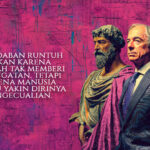
This article was previously published in Indopos in May 2018
“We have cause to regret that a legal concept of “terrorism” was ever inflicted upon us. The term is imprecise; it is ambiguous; and above all, it serves no operative legal purpose,” said Richard R. Baxter, a former Judge of the International Court of Justice.
There’s a saying in epistemology, the branch of philosophy that delves into the nature and scope of knowledge, which asserts, “You cannot solve a problem without defining it.” This is precisely the predicament at the outset of every terrorism study. The term ‘terrorism’ is fraught with political and subjective shades, often labeled by one party, usually the government, onto another to discredit and delegitimize them. It’s rare for any group to self-identify as terrorists, given the negative implications of ‘terror’ and ‘terrorism’ in the public consciousness.
The subjectivity involved further complicates the quest for an objective definition. It’s often stated, “One person’s terrorist is another’s freedom fighter.” For example, Hamas members are deemed terrorists by the Israeli government and its citizens, yet to the people of Gaza, they are freedom fighters.
This subjectivism is often entangled with political alliances. For instance, the African National Congress and its leader, Nelson Mandela, who fought against apartheid, were labeled terrorists not just by the South African government but also by the United States, which was allied with South Africa at the time. Interestingly, Nelson Mandela remained on the U.S. terrorism watch list until 2008, despite having retired from politics for nine years.
Despite the muddy waters of definition, there have been efforts to define terrorism since 1937, initially by the League of Nations and later by the United Nations. However, these efforts have not yet culminated in a universally accepted definition.
Thus, we are faced with a situation where there isn’t just one definition of terrorism in the world but hundreds, even thousands. Moreover, these definitions not only differ from one country to another but can also vary between different institutions within the same country. For instance, the definition of terrorism according to the U.S. Department of Homeland Security differs from that of the Department of Defense, the FBI, and the CIA. This certainly doesn’t help in clarifying the concept of terrorism, which is often misused and misinterpreted by various parties for their respective interests.
In their book “Political Terrorism,” Alex P. Schmid and A.J. Jongman have gathered 109 definitions of terrorism from leading experts and academics. From these definitions, five key words and phrases emerge as dominant: violence, political, fear/terror, threat, and psychological impact. These key elements help provide a basic understanding of terrorism, but several other components are necessary for a more comprehensive and objective understanding.
Components of an Objective Definition
At least three key components are vital in concocting an objective definition of terrorism. First, the component of the message intended to be conveyed through an act of terror must be present. Essentially, terrorism exploits the misfortune or even the death of victims to send a message (and sow seeds of fear) to a broader society or a specific target audience. Although the victims often die in horrific circumstances, for terrorists, they are merely a medium to convey a message to a wider target audience. This differentiates ordinary acts of violence from terrorism, where the perpetrator (A) harms/kills a victim (B) to intimidate and send a message to the wider society (C). In contrast, in ordinary acts of violence, the perpetrator (A) harms/kills the victim (B) due to certain factors (such as hatred, revenge, etc.) without any message to others (C).
Second, terrorist acts can be perpetrated by anyone—whether non-state actors (groups, organizations, individuals/lone wolves, etc.) or state actors. Often, definitions of terrorism crafted by states pin terrorist acts only on non-state actors, thereby exempting themselves from being accused of terrorism. Yet, history shows well that states can also launch acts of terror against their own populations or others.
Third, terrorist acts can be motivated by any cause. While terrorism in the name of religion is currently rampant worldwide, previously, terrorism driven by political and nationalist ideologies was more dominant. We’ve heard of the Ku Klux Klan (KKK) in the United States, FARC in Colombia, and the Tamil Tigers in Sri Lanka launching terror actions based on right-wing, left-wing, and nationalist/separatist ideologies. Additionally, there’s what’s called single-issue terrorism, where a terror group focuses only on one topic, such as the Animal Liberation Front in England, which has targeted individuals or companies harming animals.
Considering the above key words/phrases and components, an objective definition of terrorism, in the author’s view, is the use of violence or the threat of violence against both symbolic and non-symbolic targets, intended to create fear and change the perceptions and behavior of a broader audience. With this definition, anyone using violence to terrorize the general public, regardless of their ideology, can be categorized as engaging in terrorist acts. Likewise, if a state behaves in such a manner, it too can be accused of launching terrorist actions.




